英语语法肯定句变一般疑问句及回答
英语语法肯定句变一般疑问句

英语语法专项练习句子专项训练5一、把下列句子改为一般疑问句。
1.I have two maps.Do you have two maps?答案解析:含实义动词的一般疑问句的构成,如果主语是第三人称单数,要在句首加does,这时谓语要变回原形。
如果不是,就在句首加do。
但如是第一人称,最好将其改成第二人称,其他不变。
2.They are teachers.Are they teachers?答案解析:一般疑问句的改法,当陈述句中有am /is / are/can时,可直接将它们提至主语前,但如是第一人称,最好将其改成第二人称,其他不变。
3.It’s a beautiful city.Is it a beautiful city?答案解析:一般疑问句的改法,当陈述句中有am /is / are时,可直接将它们提至主语前,但如是第一人称,最好将其改成第二人称,其他不变。
4.Mrs Chen works in a library in a town.Does Mrs chen work in a library in a town?答案解析:含实义动词的一般疑问句的构成,如果主语是第三人称单数,要在句首加does,这时谓语要变回原形。
如果不是,就在句首加do。
但如是第一人称,最好将其改成第二人称,其他不变。
5.I can speak Chinese.Can you speak Chinese?答案解析:一般疑问句的改法,当陈述句中有am /is / are/can时,可直接将它们提至主语前,但如是第一人称,最好将其改成第二人称,其他不变。
6.They are playing football.Are they playing football?答案解析:一般疑问句的改法,当陈述句中有am /is / are时,可直接将它们提至主语前,但如是第一人称,最好将其改成第二人称,其他不变。
7.He has a new car.Does he have a new car?答案解析:含实义动词的一般疑问句的构成,如果主语是第三人称单数,要在句首加does,这时谓语要变回原形。
语法总结(顺口溜)适合小、初、高中学习者
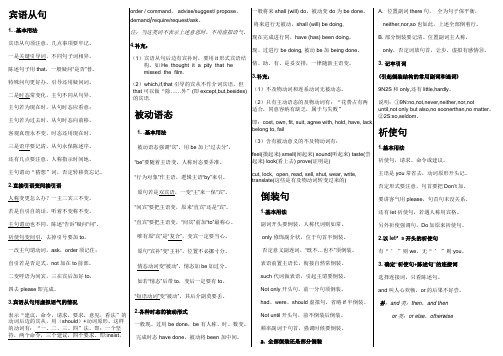
宾语从句1. .基本用法宾语从句须注意,几点事项要牢记。
一是关键引导词,不同句子词相异。
陈述句子用that,一般疑问“是否”替。
特殊问句更好办,引导还用疑问词。
二是时态常变化,主句不同从句异。
主句若为现在时,从句时态应看意;主句若为过去时,从句时态向前移。
客观真理永不变,时态还用现在时。
三是语序要记清,从句永保陈述序。
还有几点要注意,人称指示时间地。
主句谓动“猜想”词,否定转移莫忘记。
2.直接引语变间接引语人称变更怎么办?一主二宾三不变。
若是自引自的话,听着不变称不变。
主句谓动也不同,陈述“告诉”疑问“问”。
祈使句变间引,去掉引号要加to。
一改主句谓动词,ask,order须记住;直引若是否定式,not加在to前部。
二变呼语为间宾,三在宾后加好to,四去please即完成。
3.宾语从句用虚拟语气的情况表示“建议,命令,请求,要求,意见,看法”的动词后边的宾从,用(should)+动词原形。
这样的动词有:“一、二、三、四”法。
即:一个坚持,两个命令,三个建议,四个要求。
即:insist,order / command, advise/suggest/ propose,demand/require/request/ask。
注:当这类词不表示上述意思时,不用虚拟语气。
4.补充:(1)宾语从句后边有宾补时,要用it形式宾语结构,如He thought it a pity that hemissed the film.(2)which,if,that 引导的宾从不作介词宾语,但that 可以做“除……外”(即except,but,besides)的宾语.被动语态1. .基本用法被动语态强调“宾”,用 be加上“过去分”。
“be”要随着主语变,人称时态要弄准。
“行为对象”作主语,逻辑主语“by”来引。
原句若是双宾语,一变“主”来一保“宾”。
“间宾”要把主语变,原来“直宾”还是“宾”。
“直宾”要把主语变,“间宾”前加“to”最称心。
初中英语知识点归纳肯定句否定句和一般疑问句的转换
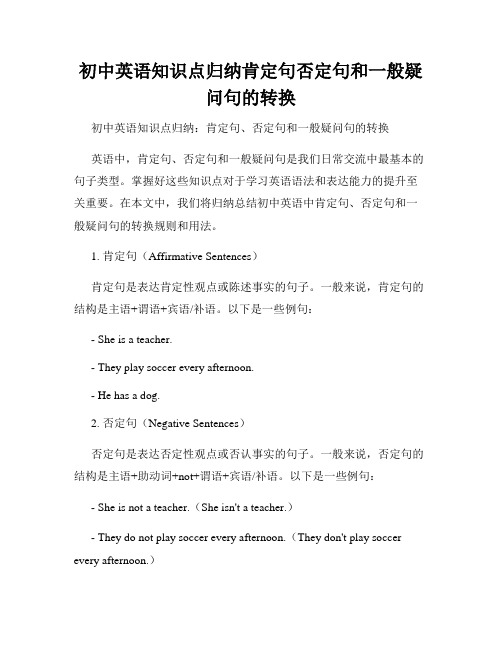
初中英语知识点归纳肯定句否定句和一般疑问句的转换初中英语知识点归纳:肯定句、否定句和一般疑问句的转换英语中,肯定句、否定句和一般疑问句是我们日常交流中最基本的句子类型。
掌握好这些知识点对于学习英语语法和表达能力的提升至关重要。
在本文中,我们将归纳总结初中英语中肯定句、否定句和一般疑问句的转换规则和用法。
1. 肯定句(Affirmative Sentences)肯定句是表达肯定性观点或陈述事实的句子。
一般来说,肯定句的结构是主语+谓语+宾语/补语。
以下是一些例句:- She is a teacher.- They play soccer every afternoon.- He has a dog.2. 否定句(Negative Sentences)否定句是表达否定性观点或否认事实的句子。
一般来说,否定句的结构是主语+助动词+not+谓语+宾语/补语。
以下是一些例句:- She is not a teacher.(She isn't a teacher.)- They do not play soccer every afternoon.(They don't play soccer every afternoon.)- He does not have a dog.(He doesn't have a dog.)需要注意的是,在一般现在时的肯定句中,动词be的否定形式是在be动词后面添加not,而其他动词则需在动词前面加助动词do或does,并在其后紧跟not。
3. 一般疑问句(General Interrogative Sentences)一般疑问句是用来询问陈述句的句子,其结构是将陈述句的主语和谓语动词调换位置。
需要注意的是,一般疑问句的结尾需要使用问号。
以下是一些例句:- Is she a teacher?- Do they play soccer every afternoon?- Does he have a dog?其中,be动词的一般疑问句形式是将be动词放在主语前面,其他动词则需在句首添加助动词do或does。
三年级下册英语试题英语语法练习-全国通用
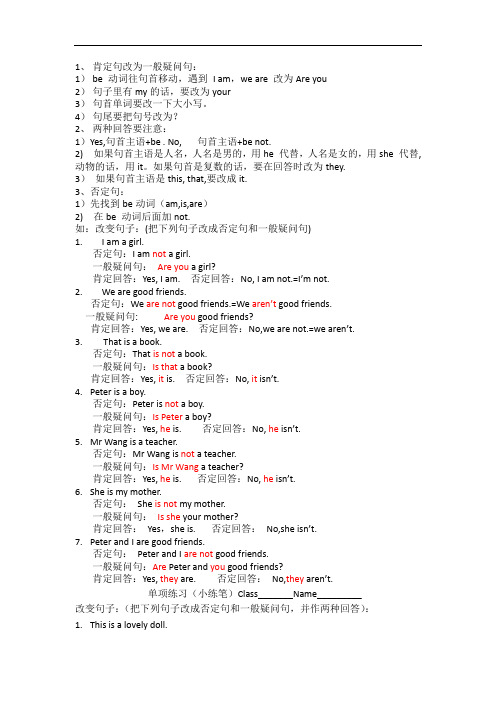
1、肯定句改为一般疑问句:1)be 动词往句首移动,遇到I am,we are 改为Are you2)句子里有my的话,要改为your3)句首单词要改一下大小写。
4)句尾要把句号改为?2、两种回答要注意:1)Yes,句首主语+be . No, 句首主语+be not.2) 如果句首主语是人名,人名是男的,用he 代替,人名是女的,用she 代替,动物的话,用it。
如果句首是复数的话,要在回答时改为they.3)如果句首主语是this, that,要改成it.3、否定句:1)先找到be动词(am,is,are)2) 在be 动词后面加not.如:改变句子:(把下列句子改成否定句和一般疑问句)1.I am a girl.否定句:I am not a girl.一般疑问句:Are you a girl?肯定回答:Yes, I am. 否定回答:No, I am not.=I’m not.2.We are good friends.否定句:We are not good friends.=We aren’t good friends.一般疑问句: Are you good friends?肯定回答:Yes, we are. 否定回答:No,we are not.=we aren’t.3. That is a book.否定句:That is not a book.一般疑问句:Is that a book?肯定回答:Yes, it is. 否定回答:No, it isn’t.4.Peter is a boy.否定句:Peter is not a boy.一般疑问句:Is Peter a boy?肯定回答:Yes, he is. 否定回答:No, he isn’t.5.Mr Wang is a teacher.否定句:Mr Wang is not a teacher.一般疑问句:Is Mr Wang a teacher?肯定回答:Yes, he is. 否定回答:No, he isn’t.6.She is my mother.否定句:She is not my mother.一般疑问句:Is she your mother?肯定回答:Yes,she is. 否定回答:No,she isn’t.7.Peter and I are good friends.否定句:Peter and I are not good friends.一般疑问句:Are Peter and you good friends?肯定回答:Yes, they are. 否定回答:No,they aren’t.单项练习(小练笔)Class_______Name_________改变句子:(把下列句子改成否定句和一般疑问句,并作两种回答):1.This is a lovely doll.否定句:一般疑问句:肯定回答:否定回答:2.Danny is a pupil.否定句:一般疑问句:肯定回答:否定回答:3.Miss Li is my teacher.否定句:一般疑问句:肯定回答:否定回答:4.I am a nurse.否定句:一般疑问句:肯定回答:否定回答:5.We are in the park.否定句:一般疑问句:肯定回答:否定回答:6.Ben and Peter are good friends.否定句:一般疑问句:肯定回答:否定回答:8.She is my teacher.否定句:_______________________________一般疑问句_________________________________肯定回答:___________________ 否定回答:____________ 9.This is a book.否定句:__________________________________一般疑问句:____________________________________肯定回答:___________________ 否定回答:______________、。
新概念第一册英语全面语法总结 (1)
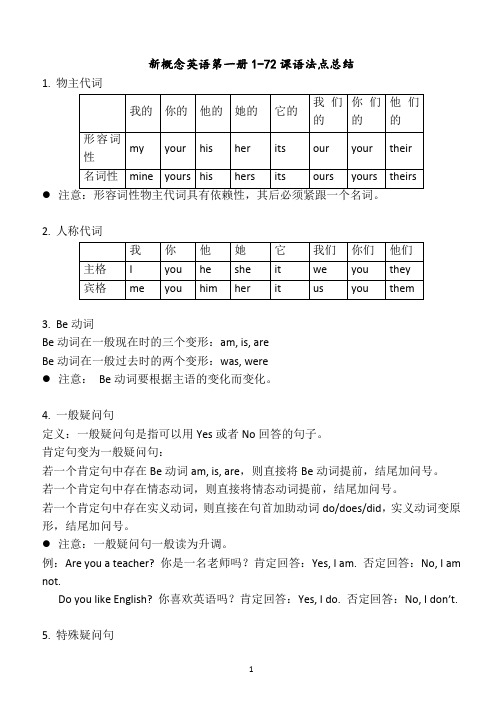
新概念英语第一册1-72课语法点总结1.物主代词我的你的他的她的它的我们的你们的他们的形容词性my your his her its our your their 名词性mine yours his hers its ours yours theirs●注意:形容词性物主代词具有依赖性,其后必须紧跟一个名词。
2.人称代词我你他她它我们你们他们主格I you he she it we you they宾格me you him her it us you them3.Be动词Be动词在一般现在时的三个变形:am, is, areBe动词在一般过去时的两个变形:was, were●注意:Be动词要根据主语的变化而变化。
4.一般疑问句定义:一般疑问句是指可以用Yes或者No回答的句子。
肯定句变为一般疑问句:若一个肯定句中存在Be动词am, is, are,则直接将Be动词提前,结尾加问号。
若一个肯定句中存在情态动词,则直接将情态动词提前,结尾加问号。
若一个肯定句中存在实义动词,则直接在句首加助动词do/does/did,实义动词变原形,结尾加问号。
●注意:一般疑问句一般读为升调。
例:Are you a teacher? 你是一名老师吗?肯定回答:Yes, I am. 否定回答:No, I am not.Do you like English? 你喜欢英语吗?肯定回答:Yes, I do. 否定回答:No, I don’t.5.特殊疑问句定义:不能用Yes或者No回答的句子。
构成:特殊疑问词+ 一般疑问句特殊疑问词:what(什么), when(何时), where(何地), who(谁), whom(谁宾格), whose(谁的), which(哪个), why(为什么), how(怎么样)口诀:非常八加一6.不定冠词a/an若单词是以“a, e, i, o”四个元音开头,其前面选用“an”;若单词是以元音字母“u”开头,视情况而定。
(知识点)肯定句否定句和一般疑问句的转换

(知识点)肯定句否定句和一般疑问句的转换肯定句、否定句和一般疑问句是英语语法中的基本概念,它们在日常交流以及英语学习中起着重要的作用。
本文将详细探讨这三种句子结构的转换方法,并且给出一些实例以帮助读者更好地理解和运用。
一、肯定句的转换在转换肯定句时,我们一般使用否定词"not"来实现。
将肯定句转换为否定句的方法可以分为两种情况:1. 当肯定句中没有助动词时,我们在句子中加入助动词"do",并在"do"后面加上否定词"not"。
例如:肯定句:She speaks English.否定句:She does not speak English.2. 当肯定句中已经包含助动词时,我们直接在助动词后面加上否定词"not"即可。
例如:肯定句:He can swim.否定句:He cannot swim.需要注意的是,在口语中,人们常常使用缩略形式来表示否定形式。
例如,"does not"缩写为"doesn't","cannot"缩写为"can't"。
二、否定句的转换与肯定句相反,我们要将否定句转换为肯定句时,需要去掉否定词"not"。
1. 当否定句中含有助动词时,我们直接去掉否定词"not"即可。
例如:否定句:I am not interested in sports.肯定句:I am interested in sports.2. 当否定句中没有助动词时,我们需要添加助动词"do",并将助动词变为肯定形式。
例如:否定句:They don't like spicy food.肯定句:They do like spicy food.需要注意的是,一些动词本身已经具有否定意义,如"nobody"(没有人)、"nothing"(没有什么)等。
句型转换和特殊疑问句的语法

句型转换和特殊疑问句的语法肯定句、否定句、一般疑问句的相互转换一、含有的be动词、助动词和情态动词的句子;一律在be动词、助动词和情态动词后加“not”,改为一般疑问句时,一律将be动词、助动词和情态动前移到句首(首字母大写)。
肯定回答用“Yes”;否定回答用“No”。
“Yes”或“No”后面的主语必须用代词,“No”后面必须用否定缩略式。
1. There are some computers in this school. (be动词)There aren’t any computers in this school.Are there any computers in this school? (Y es, there are. / No, there aren't.)2. Li Ming’s father can drive the car. (情态动词)Li Ming’s father can’t drive the car.Can Li Ming’s father drive the car? (Yes, he can. / No, he can’t.)3. She has already finished his homework now. (助动词)She hasn’t finished his homework yet.Has she finished his homework yet? (Y es, she has. / No, she hasn’t.)二、只有行为动词的句子。
必须借助助动词do; does; did。
改为否定句,在行为动词前加don’t(一般现在时态,主语是除第三人称单数之外的人称和数时);doesn’t(一般现在时态,主语是第三人称单数时);didn’t(一般过去时态)。
改为一般疑问句时,在句首加Do;Does 或Did。
肯定回答用“Yes”,后面动词用 do; does或did”;否定回答用“No”,后面动词用don’t (doesn’t; didn’t)”。
最新小学英语语法肯定句变一般疑问句、特殊疑问句的用法归纳总结
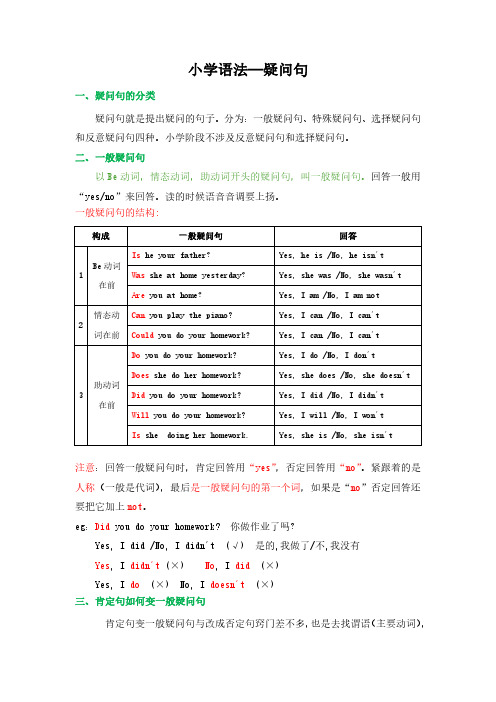
小学语法—疑问句一、疑问句的分类疑问句就是提出疑问的句子。
分为:一般疑问句、特殊疑问句、选择疑问句和反意疑问句四种。
小学阶段不涉及反意疑问句和选择疑问句。
二、一般疑问句以Be动词,情态动词,助动词开头的疑问句,叫一般疑问句。
回答一般用“yes/no”来回答。
读的时候语音音调要上扬。
一般疑问句的结构:构成一般疑问句回答1Be动词在前Is he your father?Yes,he is/No,he isn´t Was she at home yesterday?Yes,she was/No,she wasn´t Are you at home?Yes,I am/No,I am not2情态动词在前Can you play the piano?Yes,I can/No,I can´t Could you do your homework?Yes,I can/No,I can´t3助动词在前Do you do your homework?Yes,I do/No,I don´tDoes she do her homework?Yes,she does/No,she doesn´t Did you do your homework?Yes,I did/No,I didn´tWill you do your homework?Yes,I will/No,I won´tIs she doing her homework.Yes,she is/No,she isn´t注意:回答一般疑问句时,肯定回答用“yes”,否定回答用“no”。
紧跟着的是人称(一般是代词),最后是一般疑问句的第一个词,如果是“no”否定回答还要把它加上not。
eg:Did you do your homework?你做作业了吗?Yes,I did/No,I didn´t(√)是的,我做了/不,我没有Yes,I didn´t(×)No,I did(×)Yes,I do(×)No,I doesn´t(×)三、肯定句如何变一般疑问句肯定句变一般疑问句与改成否定句窍门差不多,也是去找谓语(主要动词),再变化,遇到some要变成any。
英语语法之肯定句变一般疑问句
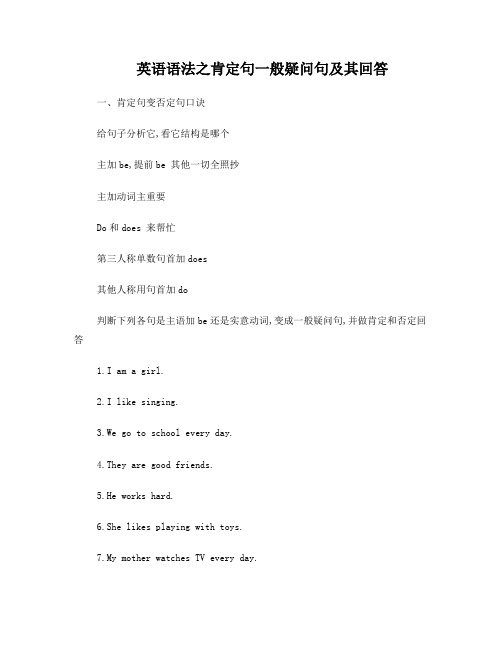
英语语法之肯定句一般疑问句及其回答一、肯定句变否定句口诀给句子分析它,看它结构是哪个主加be,提前be 其他一切全照抄主加动词主重要Do和does 来帮忙第三人称单数句首加does其他人称用句首加do判断下列各句是主语加be还是实意动词,变成一般疑问句,并做肯定和否定回答1.I am a girl.2.I like singing.3.We go to school every day.4.They are good friends.5.He works hard.6.She likes playing with toys.7.My mother watches TV every day.8.You are a beautiful girl.9.Tom is playing football on the playground.10.Bill does his homework after supper.三、肯定句一般疑问句规则肯定句主语+be+其他变成be+主语+其他主语+动词+其他变成Do+主语+动词+其他主语(第三人称单数)+动词单三+其他变成Does+主语(第三人称单数)+动词原形+其他练习:变成一般疑问句,并做肯定和否定回答1.She is watching TV now.2.We go to school on Sunday.3.His father works hard.4.Jack's mother is a nurse.5.The cat runs fast.6.They like reading books.7.My grandpa gives me a hot dog.8.Tom often walks to school.9.I have a doll.10.It is eating fish.一、按要求完成句子(要求:变成一般疑问句,并做肯定和否定回答1. I am a student.→2. They are English cars.、3. This is a pencil-box.4. Its name is Polly.5. Jim is at school.6. These are my English books.7. I know his name.。
英语语法之肯定句变一般疑问句
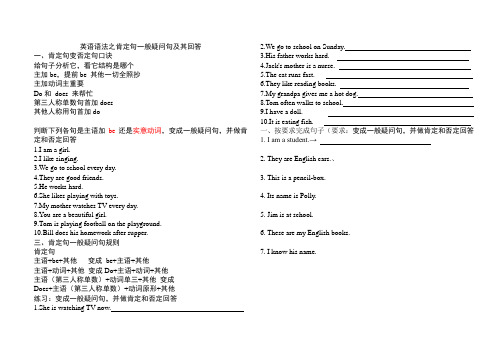
英语语法之肯定句一般疑问句及其回答一、肯定句变否定句口诀给句子分析它,看它结构是哪个主加be,提前be 其他一切全照抄主加动词主重要Do和does 来帮忙第三人称单数句首加does其他人称用句首加do判断下列各句是主语加be还是实意动词,变成一般疑问句,并做肯定和否定回答1.I am a girl.2.I like singing.3.We go to school every day.4.They are good friends.5.He works hard.6.She likes playing with toys.7.My mother watches TV every day.8.You are a beautiful girl.9.Tom is playing football on the playground.10.Bill does his homework after supper.三、肯定句一般疑问句规则肯定句主语+be+其他变成be+主语+其他主语+动词+其他变成Do+主语+动词+其他主语(第三人称单数)+动词单三+其他变成Does+主语(第三人称单数)+动词原形+其他练习:变成一般疑问句,并做肯定和否定回答1.She is watching TV now.2.We go to school on Sunday.3.His father works hard.4.Jack's mother is a nurse.5.The cat runs fast.6.They like reading books.7.My grandpa gives me a hot dog.8.Tom often walks to school.9.I have a doll.10.It is eating fish.一、按要求完成句子(要求:变成一般疑问句,并做肯定和否定回答1. I am a student.→2. They are English cars.、3. This is a pencil-box.4. Its name is Polly.5. Jim is at school.6. These are my English books.7. I know his name.。
英语语法之肯定句变一般疑问句资料

英语语法之肯定句变一般疑问句英语语法之肯定句一般疑问句及其回答一、肯定句变否定句口诀给句子分析它,看它结构是哪个主加be,提前be 其他一切全照抄主加动词主重要Do和 does 来帮忙第三人称单数句首加does其他人称用句首加do判断下列各句是主语加be还是实意动词,变成一般疑问句,并做肯定和否定回答1.I am a girl.2.I like singing.3.We go to school every day.4.They are good friends.5.He works hard.6.She likes playing with toys.7.My mother watches TV every day.8.You are a beautiful girl.9.Tom is playing football on the playground.10.Bill does his homework after supper.三、肯定句一般疑问句规则肯定句主语+be+其他变成 be+主语+其他主语+动词+其他变成Do+主语+动词+其他主语(第三人称单数)+动词单三+其他变成Does+主语(第三人称单数)+动词原形+其他练习:变成一般疑问句,并做肯定和否定回答1.She is watching TV now.2.We go to school on Sunday.3.His father works hard.4.Jack's mother is a nurse.5.The cat runs fast.6.They like reading books.7.My grandpa gives me a hot dog.8.Tom often walks to school.9.I have a doll.10.It is eating fish.一、按要求完成句子(要求:变成一般疑问句,并做肯定和否定回答1. I am a student.→2. They are English cars.、3. This is a pencil-box.4. Its name is Polly.5. Jim is at school.6. These are my English books.7. I know his name.。
小学英语语法专项肯定句变一般疑问句

一般疑问句: Does she have any bread for lunch today?
肯定回答: Yes, she does.
否定回答:
No, she doesn’t.
Thanks for watching!
小学英语语法专项 肯定句变一般疑句
中文解释什么是一般疑问句
是的,我是。
不,我不是。
你是一名小学生吗?
中文解释什么是一般疑问句
是的,她喜欢。
不,她不喜欢。
她喜欢唱歌吗?
英语中的一般疑问句
一.什么是一般疑问句?
一般疑问句是疑问句的一种。它是一般只用
yes(是)或 no(否)来回答的
句子 。
英语中的一般疑问句
肯定回答:__Y_e_s___, _t_h_e_r_e__a_r_e_. 否定回答:__N_o____, _t_h_e_r_e__a_r_e_n’t.
6. There is some bread on the table.
___Is___ there __a_n_y__ on the table?
肯定回答:___Y_e_s__, _t_h_e_r_e_i_s_.__ 否定回答:___N__o__, _th__e_re__i_s_n_’_t.
_A__r_e_ they _w_a_t_c_h_in_g_ TV now?
肯定回答:__Y_e_s___, __th__e_y_a_r_e_.___ 否定回答:__N_o____, __th__e_y__a_r_e_n_’_t.
例句:
5. There are some books.
_A__re__ there ___a_n_y_ books?
英语中的一般疑问句
(完整)小学英语语法
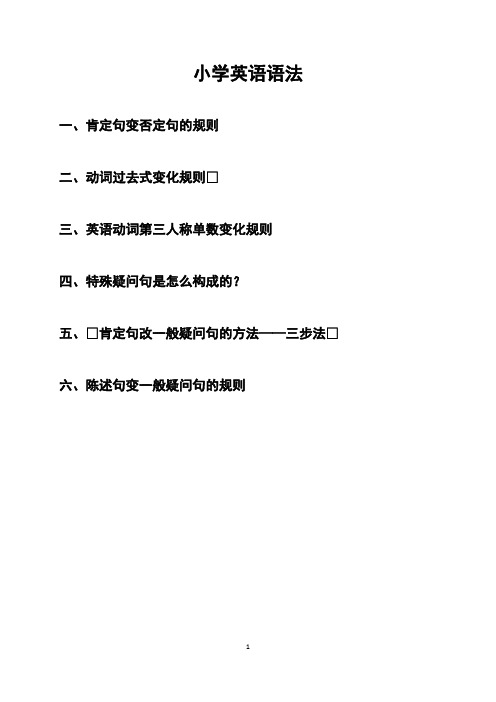
小学英语语法一、肯定句变否定句的规则二、动词过去式变化规则 三、英语动词第三人称单数变化规则四、特殊疑问句是怎么构成的?五、 肯定句改一般疑问句的方法——三步法 六、陈述句变一般疑问句的规则一、肯定句变否定句的规则 肯定句改否定句的方法 先观察句中是否有BE动词和情态动词, 1、 如果有be动词,在be动词后加not即可。
如:is not , are not , am not, was not, were not; 2、 如果有情态动词,在can,should, will等后加not。
如:cannot, should not, will not; 3、 如果上述都没有的,在动词前加助动词否定形式don’t/ doesn’t/ didn’t。
注意:肯定句改成否定句时,some 改成any。
二、动词过去式变化规则 一、规则变化 1、 一般情况下,动词词尾加-ed, 如:work—worked play—played want—wanted ask—asked talk—talked 2、 以不发音的-e结尾动词,动词词尾加-d, 如:live—lived move—moved taste—tasted 3、 以“辅音字母+y”结尾的动词,把y改成i, 加—ed, 如:study—studies try—tried copy—copied carry—carried 4、 重读闭音节动词,双写词尾辅音字母,再加—ed, 如:stop—stopped 二、不规则变化 is am—was are—were do—did have has—had go—went meet—met come—came take—took steal—stole eat—ate fly—fliew run—ran see—saw say—said make—made find—found stand—stood sit—sat sing—sang drink—drank give—gave ring—rang swim—swam write—wrote ride—rode drive—drove draw—drew grow—grew know—knew get—got forget—forgot sweep—swept keep—kept sleep—slept speak—spoke break—broke tell—told sell—sold buy—bought think—thought catch—caught teach—taught build—built can—could shall—should will—would 过去式与动词原形一样:let—let must—must put—put read—read 三、动词过去式构成读音 1、 清辅音后读清辅音[t] (清读清) 如:jump like 2、 浊辅音后读浊辅音[d] (浊读浊) 如:listen pull 3、 元音后面读浊辅音[d] (元音后面读浊音) 如:water play 4、 [t][d]后面读[id] want need三、英语动词第三人称单数变化规则 一般现在时的肯定句中,主语为第三人称单数的动词变化主要体现在词尾的变化上,其规律为: 规则 原形 第三人称单数形式 1、一般情况下,直接在动词词尾+s 如:get take play gets takes plays 2、以s, x, sh, ch, o结尾的动词,在词尾+ es guess fix finish teach go和do guesses fixes finishes teaches goes和does 3、以辅音字母+ y 结尾的动词,先把y变为i,再加es study try fly carry worry studies tries flies carries worries 4、不规则动词(特殊情况) have behas is 1、变否定句:含有动词第三人称单数形式的句子变否定句时,要在动词前面加上doesn’t 或does not,动词的第三人称单数形式要还原成原形:格式为doesn’t/does not + 动词原形,如: He goes to school at six in the morning. (变否定句) →He doesn't go to school at six in the morning. 2、变一般疑问句:把含有动词第三人称单数形式的变成一般疑问句时,要借用助动词does,如: She goes home at five every day. →Does she go home at five every day? --- Yes, she does./No, she doesn’t. 哪些主语是第三人称单数? 1、人称代词he, she, it; 如:He likes watching TV. 他喜欢看电视。
英语肯定句改一般疑问句的方法

英语肯定句改一般疑问句的方法1.引言1.1 概述英语中,肯定句和一般疑问句是我们日常交流中经常用到的句子形式。
肯定句表达肯定的信息或陈述,而一般疑问句则用来询问信息或确认事实。
在学习英语语法和句型转换时,掌握将肯定句转变成一般疑问句的方法是非常重要的。
本文将介绍英语肯定句改变为一般疑问句的方法,并给出相关的例子和练习,以帮助读者更好地理解和运用这些句型转换的技巧。
这些方法可以帮助我们更加灵活地运用英语句子,扩展我们的表达能力。
除了提供方法和例子之外,本文还将探讨学习句型转换的启示。
通过学习如何将肯定句改变为一般疑问句,我们可以更好地理解英语句子的结构和语法规则,为进一步学习英语的语法知识打下坚实的基础。
在接下来的正文部分,我们将详细介绍英语肯定句改一般疑问句的方法,并提供具体的实例和练习。
最后,我们将对所学内容进行总结,并分享学习英语句型转换的一些启示。
通过阅读本文,希望读者能够在英语学习中更加熟练地运用肯定句和一般疑问句,提高自己的语言表达能力。
1.2文章结构1.2 文章结构本文将分为三个主要部分,即引言、正文和结论。
在引言部分,我们将概述本文的主题和目的,并简要介绍文章的结构。
在正文部分,将详细阐述英语肯定句改一般疑问句的方法。
首先,我们将对这个方法进行概述,为读者提供一个整体的了解。
接着,我们将介绍方法一:通过句型转换来改写肯定句为一般疑问句。
在这个部分,我们将提供具体的例子和解释,以帮助读者理解和掌握这种方法。
此外,我们还将介绍方法二:通过加上疑问词来改写肯定句为一般疑问句。
同样,我们会提供实际的例子和解释,以帮助读者更好地掌握这种方法。
在结论部分,我们将对本文进行总结,并强调学习英语句型转换的重要性和启示。
我们将回顾本文的主要内容,并指出读者在学习英语句型转换时需要注意的事项和技巧,以帮助他们更好地掌握这一技能。
通过这样的文章结构,我们将全面而系统地介绍英语肯定句改一般疑问句的方法,为读者提供清晰明了的指导和帮助。
初一英语语法--句型转换(详细内容)

初一英语语法--句型转换(详细内容)初一英语语法—句型转换内容:陈述句:肯定句否定句疑问句:一般疑问句特殊疑问句一.肯定句变否定句1.句子中有be,在be后加not。
(be动词有am , is , are, was, were)1)I am a student. I am not a student.2)They are blue . They aren’t blue.3) He is Kangkang. He is n’t Kangkang .4) I was ten last year. I wasn't ten yesterday.5) He was good at English. He wasn't good at English.6) They were at home last Sunday. They weren't at home last Sunday.练习:把下列句子变为否定句1.His father is an English teacher._____________________________2.He is crying under the tree. ___________________________ __3.He was thirteen years old two years ago._______________________4.They are very lucky.______________________________________5.t the family was poor.6.My voice was too weak.2.谓语是动词原形,在动词前加don’t。
7.I have a book . I don’t have a book.8.They like Chinese . They don’t like Chinese.9.3) We come from China. We don’t come from China.3.谓语动词是第三人称单数,在动词前加doesn’t,动词用原形。
英语所有句型转换的方法(陈述句变否定句一般疑问句特殊疑问句及练习)
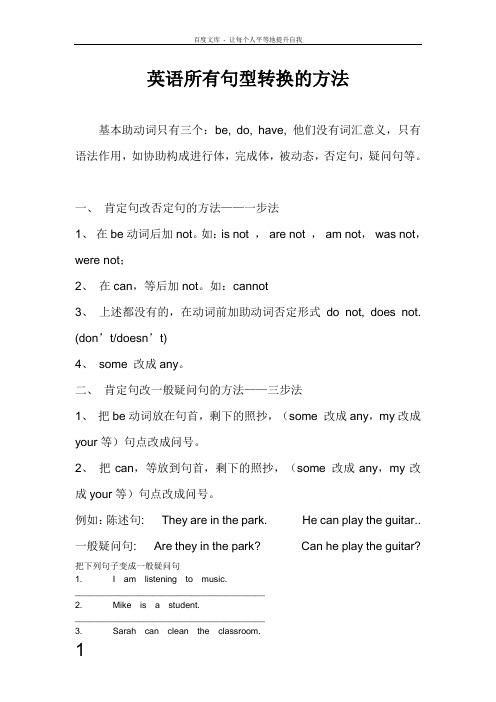
英语所有句型转换的方法基本助动词只有三个:be, do, have, 他们没有词汇意义,只有语法作用,如协助构成进行体,完成体,被动态,否定句,疑问句等。
一、肯定句改否定句的方法——一步法1、在be动词后加not。
如:is not ,are not ,am not,was not,were not;2、在can,等后加not。
如:cannot3、上述都没有的,在动词前加助动词否定形式do not, does not. (don’t/doesn’t)4、some 改成any。
二、肯定句改一般疑问句的方法——三步法1、把be动词放在句首,剩下的照抄,(some 改成any,my改成your等)句点改成问号。
2、把can,等放到句首,剩下的照抄,(some 改成any,my改成your等)句点改成问号。
例如:陈述句: They are in the park. He can play the guitar.. 一般疑问句: Are they in the park? Can he play the guitar?把下列句子变成一般疑问句1. I am listening to music._______________________________________2. Mike is a student._______________________________________3. Sarah can clean the classroom.________________________________________4. They are in the zoo.________________________________________5. There are some flowers in the vase.________________________________________is my sister._________________________________________are sweeping the floor.__________________________________________3、上述都没有的,在句首请助动词Do/Does帮忙,剩下的照抄,(some 改成any,my改成your等)句点改成问号。
小学英语语法每日一练肯定句改一般疑问句和否定句
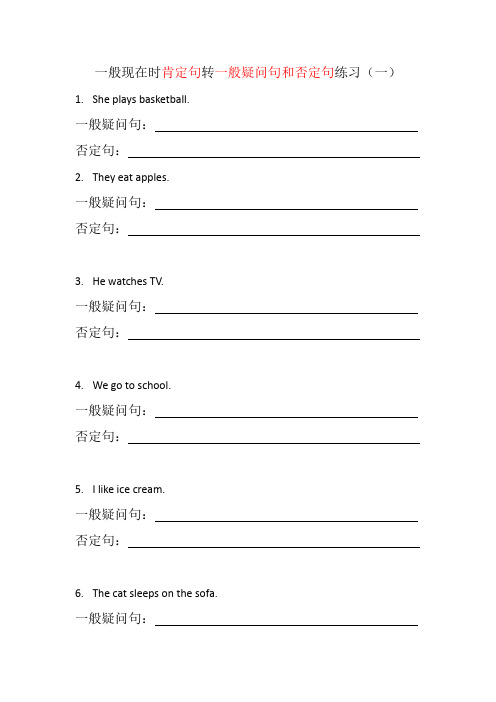
一般现在时肯定句转一般疑问句和否定句练习(一)1.She plays basketball.一般疑问句:否定句:2.They eat apples.一般疑问句:否定句:3.He watches TV.一般疑问句:否定句:4.We go to school.一般疑问句:否定句:5.I like ice cream.一般疑问句:否定句:6.The cat sleeps on the sofa.一般疑问句:否定句:7.They play soccer.一般疑问句:否定句:8.She sings beautifully. 一般疑问句:否定句:9.We study English.一般疑问句:否定句:10.He runs fast.一般疑问句:否定句:练习一答案1.She plays basketball. 一般疑问句:Does she play basketball? 否定句:She does not play basketball.2.They eat apples. 一般疑问句:Do they eat apples? 否定句:They donot eat apples.3.He watches TV. 一般疑问句:Does he watch TV? 否定句:He doesnot watch TV.4.We go to school. 一般疑问句:Do we go to school? 否定句:We donot go to school.5.I like ice cream. 一般疑问句:Do you like ice cream? 否定句:You donot like ice cream.6.The cat sleeps on the sofa. 一般疑问句:Does the cat sleep on thesofa? 否定句:The cat does not sleep on the sofa.7.They play soccer. 一般疑问句:Do they play soccer? 否定句:Theydo not play soccer.8.She sings beautifully. 一般疑问句:Does she sing beautifully? 否定句:She does not sing beautifully.9.We study English. 一般疑问句:Do we study English? 否定句:Wedo not study English.10.He runs fast. 一般疑问句:Does he run fast? 否定句:He does notrun fast.一般现在时肯定句转一般疑问句和否定句练习(二)1.The dog barks loudly.一般疑问句:否定句:2.They swim in the pool.一般疑问句:否定句:3.She reads books.一般疑问句:否定句:4.We play the piano.一般疑问句:否定句:5.He speaks Chinese.一般疑问句:否定句:6.They dance in the rain. 一般疑问句:否定句:7.She writes a letter.一般疑问句:否定句:8.We eat dinner.一般疑问句:否定句:9.He plays the guitar.一般疑问句:否定句:10.They watch movies. 一般疑问句:否定句:练习二答案1.The dog barks loudly. 一般疑问句:Does the dog bark loudly? 否定句:The dog does not bark loudly.2.They swim in the pool. 一般疑问句:Do they swim in the pool? 否定句:They do not swim in the pool.3.She reads books. 一般疑问句:Does she read books? 否定句:Shedoes not read books.4.We play the piano. 一般疑问句:Do we play the piano? 否定句:We do not play the piano.5.He speaks Chinese. 一般疑问句:Does he speak Chinese? 否定句:He does not speak Chinese.6.They dance in the rain. 一般疑问句:Do they dance in the rain? 否定句:They do not dance in the rain.7.She writes a letter. 一般疑问句:Does she write a letter? 否定句:She does not write a letter.8.We eat dinner. 一般疑问句:Do we eat dinner? 否定句:We do noteat dinner.9.He plays the guitar. 一般疑问句:Does he play the guitar? 否定句:He does not play the guitar.10.They watch movies. 一般疑问句:Do they watch movies? 否定句:They do not watch movies.。
含有情态动词的肯定句改为一般疑问句

含实义动词的句子怎样变一般疑问句
1.如果句子中的动词 为原形,变一般疑问句时 ,在句首加Do,其余不变 。
2.如果句子中的动词为第 三人称单数形式,变一般 疑问句时,在句首加 Does,然后把动词变为原 形,其余不变。
2. Peter lives in Chongqing. Does Peter live in Chongqing.
3. Lucy knows about China. Does Lucy know about China.
4. Her mother works in a school. Does her mother work in a school.
1. He wants to go to Beijing. He does’ t want to go to Beijing.
2. Peter lives in Chongqing. Peter does’ t live in Chongqing.
3. Lucy knows about China. Lucy does’ t know about China.
把下面这三个含有情态动词的肯定句改为一般疑问句。
1. I can draw.
Can you draw?
Yes, I can./No, I can’t.
2.Students should study hard.
Should students study hard?
Yes, they should./No, they shouldn’t.
大家好
复习: 含有be动词的肯定句改为一般疑问句的方法
- 1、下载文档前请自行甄别文档内容的完整性,平台不提供额外的编辑、内容补充、找答案等附加服务。
- 2、"仅部分预览"的文档,不可在线预览部分如存在完整性等问题,可反馈申请退款(可完整预览的文档不适用该条件!)。
- 3、如文档侵犯您的权益,请联系客服反馈,我们会尽快为您处理(人工客服工作时间:9:00-18:30)。
英语语法专项练习
句子专项训练6
一、把下列句子改为一般疑问句,并作简略回答。
1.Bob is reading a book.
Is Bob reading a book?
Yes,he is.
No,he isn’t.
答案解析:一般疑问句的改法,当陈述句中有am /is / are/can时,可直接将它们提至主语前,但如是第一人称,最好将其改成第二人称,其他不变。
2.He works in the factory.
Does he work in the factory?
Yes ,he does
No,he doesn’t.
答案解析:含实义动词的一般疑问句的构成,如果主语是第三人称单数,要在句首加does,这时谓语要变回原形。
如果不是,就在句首加do。
但如是第一人称,最好将其改成第二人称,其他不变。
3.Helen often does her housework after office.
Does Helen often do her housework after office.
Yes,she does.
No,she doesn’t.
答案解析:含实义动词的一般疑问句的构成,如果主语是第三人称单数,要在句首加does,这时谓语要变回原形。
如果不是,就在句首加do。
但如是第一人称,最好将其改成第二人称,其他不变。
4.There are five people in my family.
Are there five people in your family.
Yes,there are.
No,there aren’t.
答案解析:一般疑问句的改法,当陈述句中有am /is / are/can时,可直接将它们提至主语前,但如是第一人称,最好将其改成第二人称,其他不变。
5.Grandfather likes to read newspapers in the evening.
Does grandfather like to read newspapers in the evening.
Yes,he does.
No,he doesn’t.
答案解析:含实义动词的一般疑问句的构成,如果主语是第三人称单数,要在句首加does,这时谓语要变回原形。
如果不是,就在句首加do。
但如是第一人称,最好将其改成第二人称,其他不变。
6.She has lunch at school.
Does she have lunch at school?
Yes,she does.
No,she doesn’t.
答案解析:含实义动词的一般疑问句的构成,如果主语是第三人称单数,要在句首加does,这时谓语要变回原形。
如果不是,就在句首加do。
但如是第一人称,最好将其改成第二人称,其他不变。
7.Miss Li is my English teacher.
Is Miss Li my English teacher?
Yes,she is.
No,she isn’t.
答案解析:一般疑问句的改法,当陈述句中有am /is / are/can时,可直接将它们提至主语前,但如是第一人称,最好将其改成第二人称,其他不变。
8.The students are playing the guitar now.
Are the students playing the guitar now?
Yes,they are.
No,they aren’t.
答案解析:一般疑问句的改法,当陈述句中有am /is / are/can时,可直接将它们提至主语前,但如是第一人称,最好将其改成第二人称,其他不变。
9.Li Ping’s brother is a bus driver.
Is Li Ping’s brother a bus driver?
Yes,he is .
No,he isn’t.
答案解析:一般疑问句的改法,当陈述句中有am /is / are/can时,可直接将它们提至主语前,但如是第一人称,最好将其改成第二人称,其他不变。
10.We are going to the cinema.
Are you going to the cinema?
Yes,we are.
No,we aren’t.
答案解析:一般疑问句的改法,当陈述句中有am /is / are/can时,可直接将它们提至主语前,但如是第一人称,最好将其改成第二人称,其他不变。
11.I like dogs.
Do you like dogs?
Yes,I do.
No,I don’t.
答案解析:含实义动词的一般疑问句的构成,如果主语是第三人称单数,要在句首加does,这时谓语要变回原形。
如果不是,就在句首加do。
但如是第一人称,最好将其改成第二人称,其他不变。
12.I’d like some bread.
Would you like some bread?
Yes,I’d like.
No,I wouldn’t like.
答案解析:一般疑问句的改法,当陈述句中有am /is / are/can时,可直接将它们提至主语前,但如是第一人称,最好将其改成第二人称,其他不变。
13.Peter helps Lucy get the cat down.
Does peter help Lucy get the cat down?
Yes,he does.
No,he doesn’t.
答案解析:含实义动词的一般疑问句的构成,如果主语是第三人称单数,要在句首加does,这时谓语要变回原形。
如果不是,就在句首加do。
但如是第一人称,最好将其改成第二人称,其他不变。
14.This is Ann’s bedroom.
Is this Ann’s bedroom?
Yes,it is.
No,it isn’t.
答案解析:一般疑问句的改法,当陈述句中有am /is / are/can时,可直接将它们提至主语前,但如是第一人称,最好将其改成第二人称,其他不变。
15.An tiger lives in the forest.
Does an tiger live in the forest?
Yes,it does.
No,it doesn’t.
答案解析:含实义动词的一般疑问句的构成,如果主语是第三人称单数,要在句首加does,这时谓语要变回原形。
如果不是,就在句首加do。
但如是第一人称,最好将其改成第二人称,其他不变。
